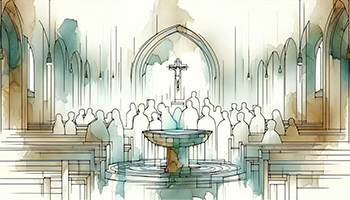
At Easter Vigil Masses recently celebrated across the world, parishes welcomed with great joy many new Catholics. Each of these new members will have undertaken their own unique journey to arrive at the moment of their initiation into our Church. This joyous event, however, is not an end to their initiation journey, but rather an invitation to a life of ongoing transformation, encouraging love of Jesus and the Catholic faith to grow and be strengthened.
To enable this transformation, the Church in her wisdom provides a further step in the process of Christian initiation called the period of post-baptismal catechesis or mystagogy – “the study of the mysteries”. The Rite of Christian Initiation of Adults (RCIA) (Study Guide) describes mystagogy as:
“a time for the community and the neophytes1 together to grow in deepening their grasp of the paschal mystery and in making it part of their lives through meditation on the Gospel, sharing in the eucharist, and doing the works of charity” (RCIA, #234).
In most parishes this final period of the RCIA process takes place between the Easter celebrations and Pentecost. Parishes are invited to make a special effort to assist the neophytes in encountering Christ in the sacraments, especially in the Mass, in the Word of God and in the community. Other postbaptismal initiatives might include a special celebration for the neophytes and their godparents at the end of the Easter season, an opportunity to meet with the local bishop if this has not occurred already and a gathering on the anniversary of their baptism (see RCIA #237-#241).
When parishes plan their RCIA process, the period of mystagogy can occasionally provide challenges. The first is that many RCIA team members, as well as the new Catholics, feel a little exhausted by all the preparation that led to the Easter Vigil. This is understandable if the ministry of accompanying the catechumen and candidates is relegated to a handful of parishioners when it is the responsibility of all the parishioners to play a part. So, while it is a great privilege to help people encounter Jesus and the Catholic faith, no one person or small team can provide all the answers or all the support the enquirers require. Therefore, any planning about the RCIA process needs to ensure there is plenty of energy left after the Easter ceremonies to provide postbaptismal catechesis.
A second challenge is that the concept of mystagogy can itself be a mystery in terms of what and how it should be offered. Many well-intentioned volunteers in this ministry have themselves not been formed in mystagogical reflection. This may sometimes result in a further “program” of instructional sessions or lessons being offered after initiation, rather than a gentle process where the neophytes are invited to reflect on how they have encountered Christ in the Sunday liturgy, the homily, the sacraments, the life of the parish and in their day-to-day living.
Related to the above challenge is the reality that many Catholics do not feel confident or competent to respond to questions arising from the neophyte’s reflections on their encounters with Christ. In humility, we should realise that none of us have all the answers. And while the formal period of mystagogy ends at Pentecost, we are all called to a life of ongoing formation and transformation. We are constantly called to consider how does our encounter with God, and our baptism, call us to live our lives differently.
Diana Macalintal, in her ebook, “Mastering Mystagogy”, writes:
“As RCIA ministers, we know mystagogy as the final period of the catechumenal process, occurring after initiation over the next 50 days ….. But mystagogy is for all our days. From the very beginning of the RCIA process, our encounters with the enquirers and later with the catechumens and candidates should be mystagogical. That mystagogical reflection continues, whether we were baptised last year or many years ago. All of us are called to constantly reflect on our experience of God, discern its meaning, renew our commitment to follow Christ, and commit ourselves to living as Christ’s disciples in the ordinary events of our daily life.”
Our invitation to you is to keep your eyes peeled for the new Catholics in your parish – or you might even encounter one in your workplace or community or sporting groups. Introduce yourself, listen to their story and be prepared to be amazed at the many ways there are of encountering Jesus in the everyday.
Resources
Rite of Christian Initiation of Adults (Study Guide). Strathfield, Australia: St Pauls Publications, 2018. Available for purchase from St Pauls.
Christian Initiation Australia Network (A community of RCIA practitioners seeking to draw people to Christ).
Macalintal, Diana. Mastering Mystagogy. USA: TeamRCIA, 2019. Available as ebook.
Benedict XVI. Post-synodal apostolic exhortation Sacramentum Caritatis. See paragraph #64 on mystagogical catechesis.
Image: Lightstock
Words: Sharon Brewer
[1] A neophyte is a person newly baptised into the Catholic faith, or who has been received into the Catholic Church



